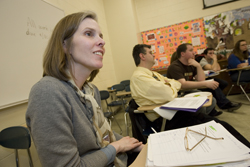Woyshner an inspiration to aspiring teachers
Great Teacher Award
 Photo by Ryan S. Brandenberg/Temple University
Christine Woyshner, associate professor of curriculum, instruction and technology in the College of Education, listens intently to a student presentation.
|
Class is in session in 207 Ritter Hall.
To capture the attention of the room filled with newly minted teachers and seasoned educators, Christine Woyshner begins her lecture by turning the lights on and off. Although some don’t realize it yet, she has just taught them an effective technique for gaining quiet and control in their own classrooms. Tonight’s lesson is on the use of primary source documents to teach history. Woyshner, an associate professor in the Department of Curriculum, Iinstruction and Technology in the College of Education, is herself an historian and member of the Historical Society of Pennsylvania’s advisory board. She’s also one of this year’s Great Teacher Award winners. |
|
|
|
|
After leading a discussion of the assigned reading, Woyshner asks the class to break into groups so they can create their own lesson plans using primary source documents. Among the students listening intently is Barry Nathan, a former newspaper man from Feasterville working toward a master’s degree. He’s taught English as a Second Language and will begin student teaching at a local school in the fall. That Woyshner has been named a Great Teacher makes perfect sense, Nathan said, because she has an ability to recognize that the path to learning is just as important as the final result. “She’s more concerned about the learning than the deadlines,” he said. “She’s relaxed and a natural in the classroom. She manages the classroom well; there are not enough superlatives for me to use about her.” Woyshner is a previous winner of the Christian R. and Mary F. Lindback Award for Distinguished Teaching (2005) and was honored with the Daniel P. Roselle Award for Outstanding Research in Social Studies from the Middle States Council for the Social Studies in 2007. She has also developed social studies materials and curricula that are currently in use by the National Council of Social Studies. But while her research has been extensive and interesting, Woyshner feels most at home in the classroom. “Being in the classroom has never gotten old,” she said. “It informs my research, teaches me about others perspectives and forces me to articulate the ideas that I hold dear in urban teacher preparation: that education can be a vehicle for social change, that teachers can make their students make sense of their world through developing engaging curricula, and that we can teach for understanding, not just the memorization of facts.” For the last two years, Woyshner served on President Ann Weaver Hart’s campuswide committee of judges for the Great Teacher Awards, so she knows the level of talent from which she was selected, she said. That she is now among them is a pleasant surprise, she said. “I’m very excited,” she said. “I’m humbled. I’m stunned.” Her scholarship, classroom performance and attention to students and research made her the best choice, said C. Kent McGuire, dean of the College of Education. “I think that the selection committee got it right,” he said. “She’s serious and thorough and a hard worker; she works hard at it. She is an historian, so she takes the long view of things and works at them in a systematic way.” For teachers in the early stages of their career like Steve Coyle, a master’s candidate who is already teaching at the Youth Build Charter School in North Philadelphia, this advice has helped him become a better teacher, he said. He’s also incorporated some of Woyshner’s classroom techniques into his own teaching, he said. “I’ve noticed that she spends significant time reading every piece of writing that I’ve written,” he said. “She always has good comments and suggestions and is really good about giving me feedback. She makes me care more about the work that I do.” Woyshner earned her Bachelor of Science degree from D’Youville College in Buffalo, N.Y. and her master’s degree in elementary education from Buffalo State College. She received her Ed.D. from Harvard University. |
|